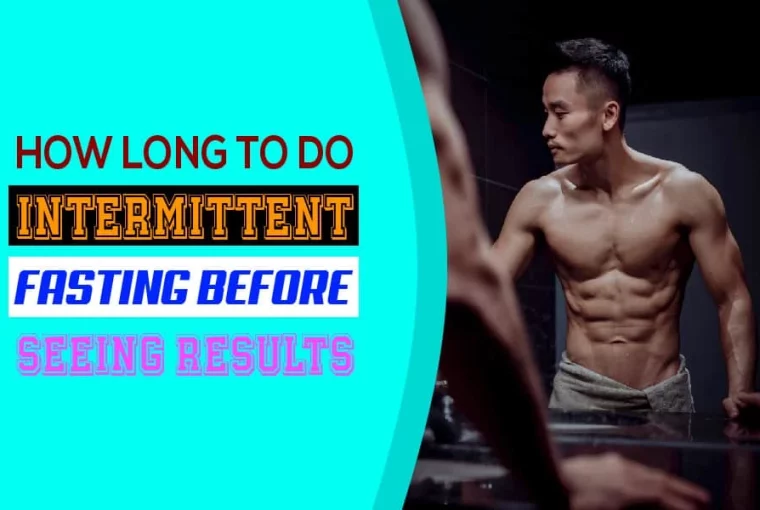Today most people are after healthier living and body toning. One of the most popular solutions among the countless options is intermittent fasting.
Intermittent fasting has garnered tremendous popularity globally, and people consider it an excellent technique to cut some kilos.
Other weight-cutting techniques include reducing the eating window, taking small meals throughout the day, etc. You can also check out https://synapsext.com for more information on how to keep healthy.
Intermittent fasting is unique since it has several different approaches. All of them focus on taking limited calories for a short time. Regarding intermittent fasting, here is the most common question people have.
How Long To Do Intermittent Fasting Before Seeing Results?
You might notice the first difference in your body after ten days of intermittent fasting. However, you’ll experience significant weight loss between 2-10 weeks.
You might end up losing about one pound weekly. Usually, the first sign that shows intermittent fasting is effective is less bloating. After intermittent fasting the first week, your midsection will appear trimmer.
Observing significant weight loss will be longer since the body requires adjusting to the new diet. People notice they have shed the first few pounds on the second week.
If not, you have to stay consistent for about 4-5 weeks; you’ll start noticing the results.
What Is Intermittent Fasting?
People naturally fast while in their sleep. However, intermittent fasting is a bit extreme. According to experts, one needs to wait at least 12 hours from the last meal to fast indeed.
For example, people wait for 12 hours before their next meal, breakfast after dinner. It’s also the reason why it’s known as breakfast “breakfast.” After 12 hours of fasting, autophagy kicks in, and cells start self-cleaning.
How Intermittent Fasting Works?
Intermittent fasting helps to remove bad mitochondria plus allows your gut to rest. Both make your body better at using stored fats as an alternative energy source.
It also naturally decreases the fat-storing hormone known as insulin. In the process, it activates the fat-burning process, which is lipolysis. In addition, intermittent fasting also reduces bloating.
The Plans
Before committing to any IF (intermittent Fasting) plan, you need to visit your doctor. After the doctor’s advice, you can go ahead with the practice.
The daily eating approach restricts to 6-8 hours. For example, there’s the 16/8 fasting approach– you have 8 hours to eat and 16 hours for fasting. According to experts, it’s the most straightforward pattern to stick to over the long term.
The other approach is 5/2; here, you have five days for regular eating in a week and then limit yourself to 500-600 calorie meals for the other two days.
For example, you can choose to eat normally for all other days in a week except Mondays and Thursdays.
From 24-72 hours, a more extended fasting period isn’t significant and can be dangerous to your health if you go for long hours without food forces the body to start saving extra fat as a starvation response.
Note that your body will get used to fasting after approximately 2-4 weeks. You will experience more hunger and feel cranky when you start this new routine.
What To Eat In Intermittent Fasting?
You can take water or zero-calorie beverages like tea and black coffee during intermittent times when not eating. In eating periods, you should eat normally – do not go crazy about the food.
You will not get healthier or lose weight when you pack your feeding time with junk food with high calories, such as super-sized treats or items.
The good thing about intermittent fasting is that you can feed on different food ranges.
However, you need to eat food that’s nutritious and good consistently. Eating with others or sharing mealtime experiences supports good health and increases satisfaction.
According to experts, the Mediterranean diet is ideal. Several unrefined and complex carbohydrates such as lean protein, healthy fats, etc. that will always work well for your health.
Benefits Of Intermittent Fasting
According to research, intermittent fasting does much more than fat burning. The metabolic and other changes usually impact the body and brain.
There are many health benefits of IF, and it includes a sharper mind, leaner body, and longer life.
In intermittent fasting, several things offer protection to different body organs against chronic diseases.
The widespread chronic diseases are heart disease, type 2 diabetes, several cancers, etc. Here are some of the general benefits of the weight cutting method (IF)
Human memory plus thinking
According to studies, the IF helps improve humans working memory and adults’ verbal memory.
Heart
Intermittent fasting is also great since it regulates blood pressure, heart resting rates, and other issues. For more tips on how to improve your heart’s health, check out https://synapsext.com
Physicality
Men that fast for 16 hours did lose some fat and still had their muscle mass. There was research on mice and those put through alternate-day feeding good running endurance.
Obesity and Diabetes
Fasting prevents obesity. Plus, most adults who have tried intermittent fasting have lost substantial weight.
Tissue Health
Intermittent fasting usually reduces surgery tissue damage and thus better results.
Is This Fasting Method Safe?
Most choose IF to manage weight or address chronic health conditions for various reasons.
Some prevalent health conditions are high cholesterol, irritable bowel syndrome, arthritis, and many more.
However, intermittent fasting doesn’t work perfectly with everyone – you should consult your doctor before committing to it. Here is a group that should steer away from intermittent fasting.
- People with a history of eating disorder
- Teens and children below 18 years
- People with blood sugar problems and diabetes
- Pregnant and breastfeeding women
Those not in this category can do intermittent fasting. It will surely be a great lifestyle change with so many benefits. Note that IF results are usually different for each individual.
It would be best to talk to an expert any time you notice headaches, nausea, and other symptoms when you begin the weight loss program.
Reasons Why Intermittent Fast Might Fail To Shed Weight
You might fast for up to 8 weeks and fail to lose weight or notice that you added extra pounds instead. Here are some of the few reasons that might be delaying your results.
You eat the wrong food type.
Other weight management techniques usually come with a food list of what you should and should not eat. However, intermittent fasting works quite differently.
You can eat anything you want within a specific eating window with intermittent fasting. Intermittent fasting doesn’t regulate your food, so you can easily slip into unhealthy feeding habits.
Consuming unhealthy processed foods will surely slow down your results. Stuffing too many calories too in your eating periods is counterproductive.
You need to change a meal plan and replace unhealthy and processed foods with healthier options. Eat foods such as whole grain, which are fiber-rich.
Other foods like sugary foods will increase your blood sugar and improve insulin sensitivity. Not using sugary foods ensures your blood sugar level stays normal.
You’re not drinking enough water.
Intermittent fasting usually restricts one’s mealtime but doesn’t restrict drinking water. You need to drink water to stay well hydrated during the fast.
Alternatively, you can take black coffee or tea to replenish lost fluids. Plus, water will keep you full until the next eating period. Therefore you won’t urge to eat snacks and pack your body with extra calories.
Drinking water is simply good for your overall health, and if you exercise, you should take more water to replace that which is lost through sweat.
You’re not eating enough food.
To many, it’ll sound counterproductive, but you surely need to eat well during intermittent fasting. Intermittent fasting doesn’t mean starvation – you can continue with your regular diet.
If you do not get enough calories in the eating window, you’ll lose more. It’s because you’ll experience uncontrollable hunger that will make you eat other foods.
Starving for a long can make your body store more fats for long-term use. It’s because the body notices when you go for more extended periods without food.
Short fasting window
The diet needs to be significantly less than normal for better intermittent fasting results. If the period between intermittent fasting and eating window is one or two hours, then you won’t notice any significant weight loss.
A 10-hour and 14-hour eating window is undoubtedly the best starting place. If you find it is long, you can try a shorter duration and increase it with time.
You’re not eating enough proteins.
Suppose your meals can sustain you to the next fasting period you need to adjust your diet. Include lean protein in your diet, the type of protein doesn’t matter; both animal and vegan protein work perfectly.
Proteins help people to stay full until their next meal. Plus, if you do exercises during this period, proteins will help build your muscles and improve bone health. The meals you take should include carbs, leafy greens, proteins, and more.
Conclusion
There are several ways to lose fat and ensure a healthy body weight. Today intermittent fasting is among the most popular weight loss methods. According to research, it’s a very effective method for the purpose.




